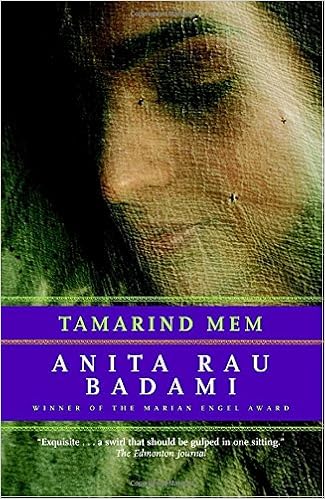
A friend recommended this book by an Indian-Canadian writer to me even while saying that it was full of bitterness. Indeed, there is bitterness. But I loved it as it spoke to my woman's heart. The themes involving traditional women's lives in India over several generations dovetailed for me with the series currently available on Netflix: "Stories by Rabindranath Tagore." Tagore was a famous Indian writer who won the Nobel Prize for Literature in 1913, the first non-European to do so. He keenly observed facets of the lives of women in the contexts of the Hindu caste system, marriage customs, and aspirations for education, change and modernization. I read "Tamarind Mem" through the Tagore's lens which I had just acquired, but I also read it simply as a woman.
There are, first of all, the issues connected to arranged marriages. The central character, the Tamarind Mem, is a young woman who is married off to a complete stranger in spite of her vocal protestations and desire for advanced education and independence. She has always had a sharp tongue, something that seems common to many Indian women in stories. Considering the distresses suffered and the lack of power in traditional situations, it is no wonder that the women resort to using their mouth to provide many tongue-lashings. Tamarind Mem is not happy. Her daughter is not happy. She is an unhappy woman making everyone unhappy. The somewhat older man she was married off to copes somehow, but is distant. He provides no friendship for his wife, no talk, no intimacy, while he proves to be a wonderfully warm father and storyteller. There is a split in his personality. The woman's upbringing also does not allow her to approach him in a more relaxed or playful way. There is only Dharma, duty. Spouses don't call each other by their names. One of the men says this: "A woman is for bed and breakfast."
The wife's isolation from her husband is crushing her. She is indeed bitter and she is often nasty. Through the book we learn to see the damage she does but also learn to understand her.
Many problems are connected to Indian customs. We see here a sensitive critique of these customs. But also, the difficulties of coping with lack of communication, of being cooped-up in a house, the crushing disappointment of failing to form a deep relationship with your husband, abandonment in marriage, lack of vulnerability in the most intimate of relationships, are universal. The pain is raw and palpable.
Her daughters seek out different paths in different lands, escaping the limitations of living in Indian society. Tamarind Mem, however, also seeks out a different life and contentment after her older husband dies.




No comments:
Post a Comment